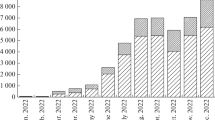Abstract
The Russian Federation now faces a totally new beginning as regards the shaping of its foreign trade relations. The demands made upon its external economic policy by the changes in the political and economic systems on the one hand and the collapse of the formerly unified economic zone of the Soviet Union on the other are so great that, in many respects, consistent answers have yet to be found. To what extent has the Russian government so far succeeded in developing a new foreign trade regime?
Similar content being viewed by others
References
In particular, see: Deutsches Institut für Wirtschaftsforschung, Ber in (DIW), Institut für Weltwirtschaft, Kiel (IfW), Institut für Wirtschaftsforschung, Halle (IWH): Die wirtschaftliche Lage Rußlands und Weißrußlands—Systemtransformation am Scheideweg, in: IWH—Forschungsberichte, No. 3, 1992.
Cf. Rossilske West, No. 29 (75), June 1992, supprement, p. 5.
Asimilar viewis also voiced with regard to the former Czechoslovakia, Poland and Hungary by V. Vincentz: Die Integration Osteuropas in diel europäische Wirtschaft Bedingunger und Konsequenzen untersch edlicher Entwicklungsstrategen. Osteuropa-Institut, Munich 1992, p. 17.
IWH estimates based on 1991 data from the Governmental Statistical Committee (Goskomstat).
Calculated in convertible roubles at the commercial exchange rate for 1991. Cf. Ekonomikaishizn, No. 13, March 1992, pp. 14–15. The share of imports cited for that year was exceptional. In the preceding years, the corresponding shares were 67% and 68%.
Cf. Außenhandel, No. 2 (1992), Moscow 1992, p. 2.
IMF: Economic Review, Common Issues and Interrepublic Refations in the Former U.S.S.R., Washington, D.C. 1992, pp. 7 f.
Cf. among others, I, Ivanov: Russia at the Crossroads in Foreign Economic Refations, in: Ekonomika i shizn', No. 31, August 1992, pp. 1–7; B. Pitschugin: Die Konzipierung der Außenwirtschaftspolitik Rußlands—Aktuelle Probleme, in: Außenhandel, No. 3, 1992, pp. 2 ff.; A. Grarberg: Economic Relations with the Former Republics of the USSR, unpublished MS (Russian); W. Gawrillow: Der regionale GUS-Markt, in: Außerhandel. Nos. 8-9, 1992, pp. 31 ff.
The Russian Governmentissued Decree No. 221 “On the mechanism for cooperation between the Russian Federation and the other CIS countries in the fields of trade and science in 1992” on 2nd April 1992.
On this, of among others B. Thancer: Nationale Währungspolitik der sowjetischen Republiken—Ausweg aus der Transformationskrise oder neue Komplikationen?, in: ifo Diskussionsbeiträge, Munich, October 1991; Rubel—Das Ende einer Währung, in: Informationsdienst des Instituts der deutscher Wirtschaft, No. 31 (1992), pp. 6 f.; Mária Huber: Chaos in der Rubelzone, in: Die Zeit. No. 42, 9th Octoper 1992, p. 43.
Cf. B. Pitschugin, op. cit. Die Konzipierung der Außenwirtschaftspolitik Rußlands—Aktuelle Probleme, in: Außenhandel, No 3, 1992, pp. 2 ff.
Goskomstat Rossii: Narodnoye khozyaistvo Rossiiskoi Federacii. Statisticeskyi ezegodnik, Moscow 1992, p. 50; ditto: Vneshneekonomiceskie svyazi RF, 1992.
Calculated from data given in Goskomstat Rossil: O razvitii ekonomiceskich reform v Rossiiskol Federacii v 1992 gody, Moscow 1993, p. 37.
Cf. L. Bass, W. Winogradow: Die Gemeinschaft unabhangiger Staaten und Osteuropa: Der Übergang zu neuen Bedingungen der Handels- und Wirtschaftsbeziehungen, in: Außenhandel, Nos. 4-5, Moscow 1992, pp. 14 ff.; Helmut Kramer: Die Integration Osteuropas, in die Weitwirtschaft, Österreichisches Institut für Wirtschaftsforschung, Monatsberichte, No. 4, 1992, pp. 221 ff.
Russia entered into such agreements during 1990 and 1991 with Bulgaria, Hungary, Poland and Czechoslovakia. Additional contractual arrangements have also been concluded with eastern European partners by individual regions (St. Petersburg, Central Ural, Tyumen District, the Republic of Komi, Tatarstan).
Cf. interview with Piotr Aven, Minister of Foreign Economic Relations, in: Handelsblatt, 12th August 1992, p. 9; B. Pitschugin, op. cit. Die Konzipierung der Außenwirtschaftspolitik Rußlands—Aktuelle Probleme, in: Außenhandel, No 3, 1992, pp. 2 ff.
Ekonomika I shizn, No. 45, Novemper 1992.
Federal Foreign Irade Information Office (BfAl): Märkte der Welt, No. 38/92, 17.9.1992, p. 9.
Author information
Authors and Affiliations
Rights and permissions
About this article
Cite this article
Werner, K. Russia’s foreign trade and the economic reforms. Intereconomics 28, 144–152 (1993). https://doi.org/10.1007/BF02928119
Issue Date:
DOI: https://doi.org/10.1007/BF02928119




